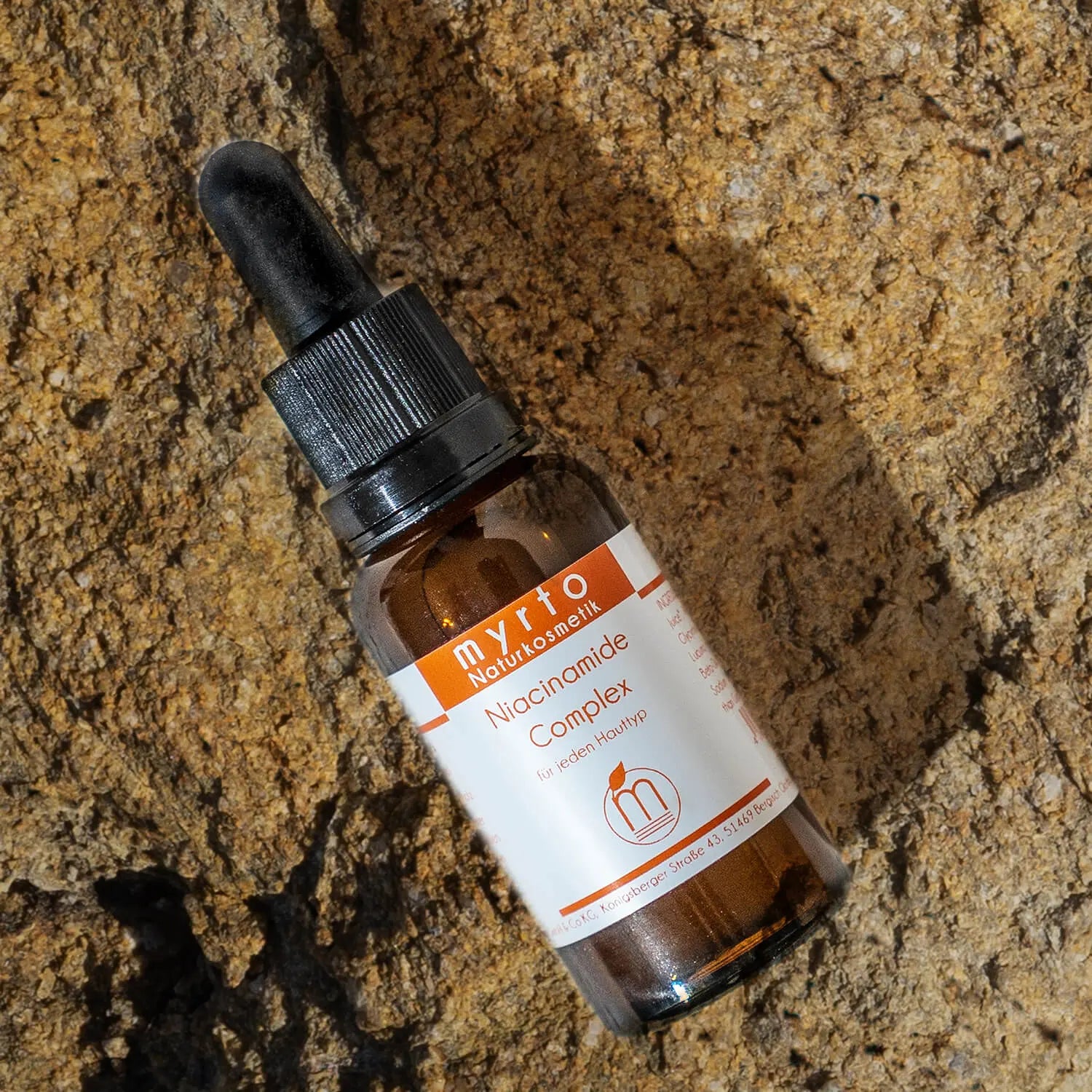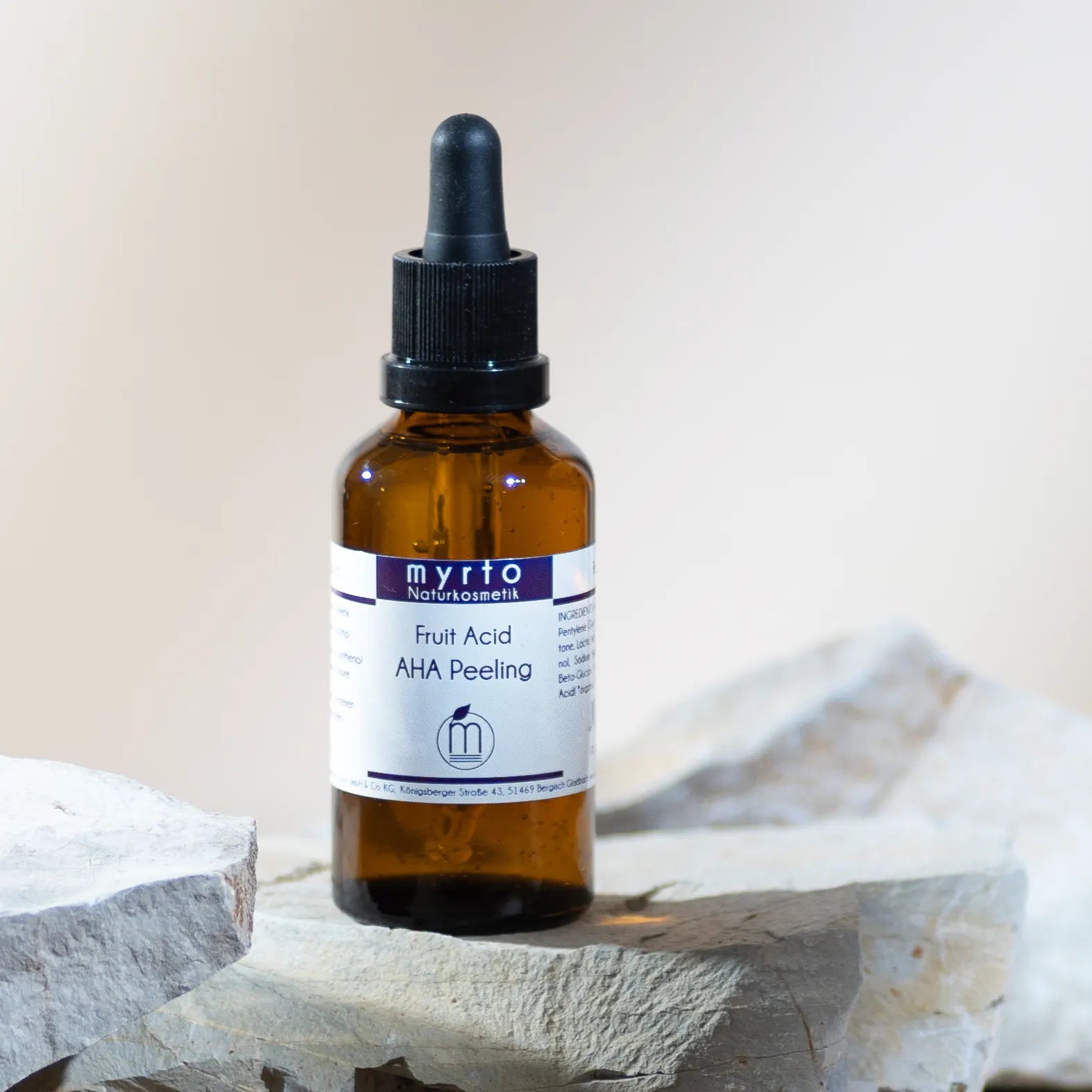
Niacinamide for even skin
Niacinamide – active ingredient miracle for healthy skin
Niacinamide, also known as vitamin B3, is a true all-rounder in modern skin care. This versatile active ingredient is particularly well-tolerated, scientifically well-researched, and suitable for virtually all skin types – even sensitive, blemish-prone, or mature skin. It's no wonder that niacinamide can now be found in many high-quality skincare products – especially those that focus on long-lasting effectiveness rather than quick results.
An even, radiant complexion without pimples, fewer wrinkles and fewer pigment spots: Niacinamide is one of the most popular, fourth most powerful and skin-friendly active ingredients in cosmetics.
What is niacinamide?
Niacinamide is a water-soluble, biologically active form of vitamin B3 – an essential cellular nutrient found in all cells of our body. This vitamin is produced only in very small amounts by the body and cannot be stored. We absorb vitamin B3 primarily through food: for example, from nuts, green vegetables, dried apricots, yeast, black tea, coffee, whole grains, eggs, fish, or meat.
What are the effects of niacinamide?
Niacinamide is one of the most thoroughly researched ingredients in natural cosmetics. Its high efficacy and particularly good tolerability have been proven by numerous independent clinical studies.
Thanks to its powerful antioxidant properties, niacinamide protects the skin from cell-damaging free radicals and counteracts the signs of aging. It inhibits inflammatory processes and helps reduce acne; it increases the formation of collagen fibers in connective tissue and strengthens the skin's protective barrier. Almost every skin type can benefit from niacinamide.
Niacinamide is one of the so-called cell-communicating active ingredients—meaning it can specifically target skin cells and exert a regulating effect there. It exerts a variety of positive effects without irritating the skin.
-
Strengthening the skin barrier
Niacinamide stimulates the production of ceramides – natural lipids essential for an intact skin barrier. This reduces moisture loss, protects against environmental influences, and makes the skin more resistant to irritation. -
Anti-inflammatory treatment for blemishes and rosacea
Thanks to its anti-inflammatory properties, niacinamide soothes redness and reduces skin irritation – ideal for acne, rosacea or sensitive, reactive skin. -
Refining the skin's appearance
Niacinamide regulates sebum production, helping to reduce clogged pores and shiny skin. At the same time, it helps shrink enlarged pores and promotes a more even skin tone. -
Protection against environmental influences
As a powerful antioxidant, niacinamide protects the skin from harmful free radicals – such as those caused by UV radiation or environmental stress – and thus prevents premature skin aging. -
Lightening of pigment spots
Niacinamide inhibits the transport of melanin to the skin's surface. This can visibly reduce pigmentation disorders, acne scars, and sun damage. The complexion appears clearer and more even.
Niacinamide for oily and impure combination skin
Oily or combination skin often suffers from redness, pimples, and enlarged pores. Niacinamide has the ability to minimize enlarged pores, making the skin appear more even-toned. Niacinamide helps balance the skin's sebum production. At the same time, vitamin B3 has antibacterial properties and inhibits inflammation. Niacinamide has also proven effective for skin problems such as rosacea.
Niacinamide for dry skin
Niacinamide stimulates the production of the skin's own lipids (ceramides), which form the skin's protective layer. It strengthens the skin barrier and improves the skin's ability to retain moisture. The result: The complexion no longer looks dull or tired, the feeling of tightness subsides, and the skin appears more supple, more radiant, and smoother.
Niacinamide against wrinkles
In mature skin, niacinamide delays skin aging by stimulating the production of collagen fibers in the connective tissue. This smoothes wrinkles and maintains skin elasticity. It can also successfully combat early signs of skin aging, such as fine lines around the eyes or on the forehead.
Niacinamide against pigment spots
In the fight against hyperpigmentation such as age spots or acne scars, niacinamide inhibits melanin synthesis and ensures a more even skin tone. Studies show significantly improved skin texture, reduced redness, and reduced pigmentation. At the same time, niacinamide protects against new cell damage caused by free radicals, thus counteracting skin aging.
Niacinamide for the scalp and hair
Niacinamide also has a positive effect in hair care. It strengthens the scalp's skin barrier, soothes itching or irritation, and promotes microcirculation. This improves the supply of nutrients to the hair roots and can thus stimulate hair growth and strengthen the hair structure.
Combine niacinamide with other active ingredients
-
Niacinamide & Hyaluronic Acid
Hyaluronic acid, a natural component of the body, binds large amounts of moisture. It plumps the skin from within, firms it, and maintains its elasticity. While niacinamide strengthens the skin barrier, hyaluronic acid is the ideal complement for firmer, smoother skin and an even complexion. -
Niacinamide & Vitamin C
Vitamin C, like niacinamide, has antioxidant properties. Both active ingredients stimulate the formation of collagen fibers in connective tissue, promote the healing process of inflammation, lighten pigment spots, and delay skin aging. Therefore, it makes a lot of sense to combine niacinamide and vitamin C in your skincare routine. -
Niacinamide & Bakuchiol
Bakuchiol and niacinamide are also a powerful duo for healthy skin structure. Like niacinamide, bakuchiol stimulates the body's own collagen production, which improves skin tone and elasticity. Bakuchiol also has the ability to promote skin regeneration and reduce the appearance of dark spots and acne scars.
Niacinamide during pregnancy and breastfeeding
Skincare products containing niacinamide are considered safe to use during pregnancy and breastfeeding. However, it's always a good idea to discuss your skincare routine with a doctor. Due to the hormonal changes during pregnancy, skin can, in rare cases, suddenly become drier or more prone to blemishes. Niacinamide, in any case, provides you with a versatile active ingredient that's suitable for a variety of skin conditions, even during pregnancy.
Niacinamide in use
To achieve maximum effectiveness and visible results, it's important that you use niacinamide regularly over a longer period of time. Try to incorporate the new Niacinamide Complex Serum into your skincare routine once or twice a day, if possible.
Depending on your individual skin condition, it's best to work your way up to your optimal concentration slowly. If you have highly sensitive skin or are trying niacinamide for the first time, a concentration of approximately 4% is recommended. This concentration is found, for example, in our Anti-Pollution Serum M for sensitive combination skin and also in the Brightening Vitamin Serum.
You can gradually increase the concentration once you've gained experience using niacinamide. Mature skin, in particular, generally benefits from higher doses above 10%, such as those found in the Niacinamide Complex Serum with 12% vitamin B3. You can massage the serum into specific areas as an intensive treatment or spread it all over your face – under a serum, face cream, or face oil. Alternatively, you can mix the Niacinamide Booster directly with your face cream.






